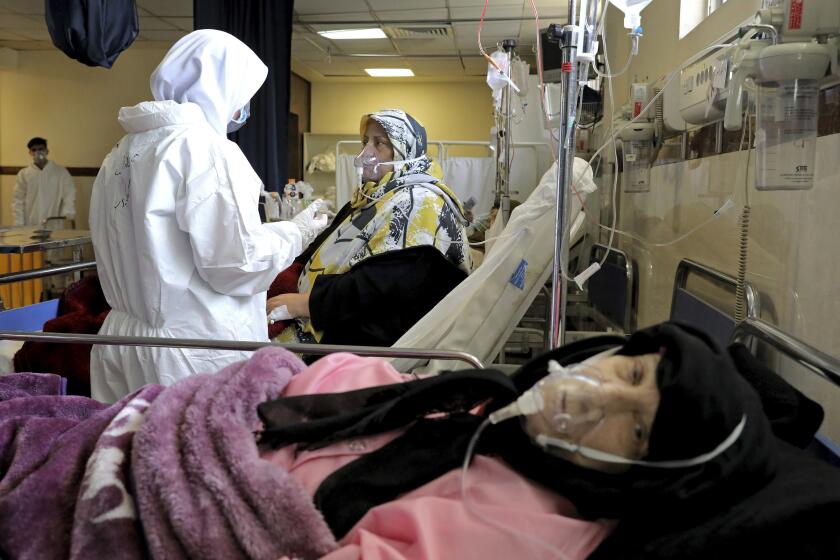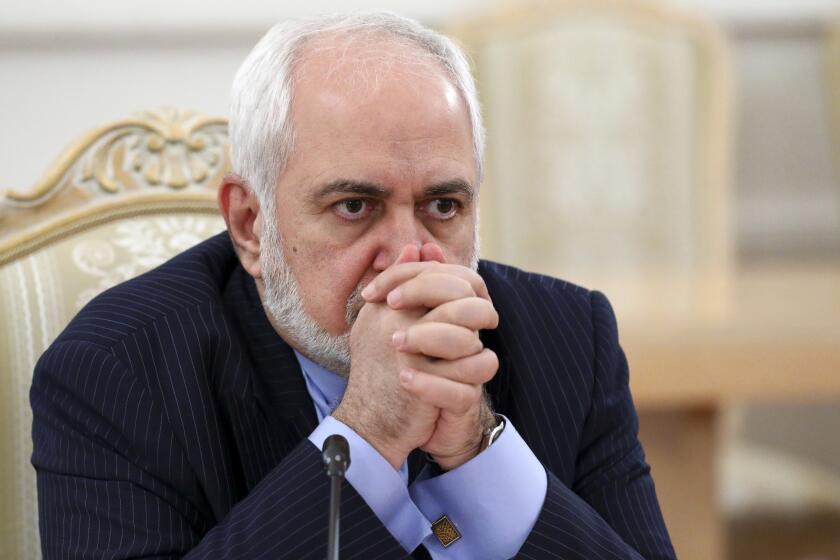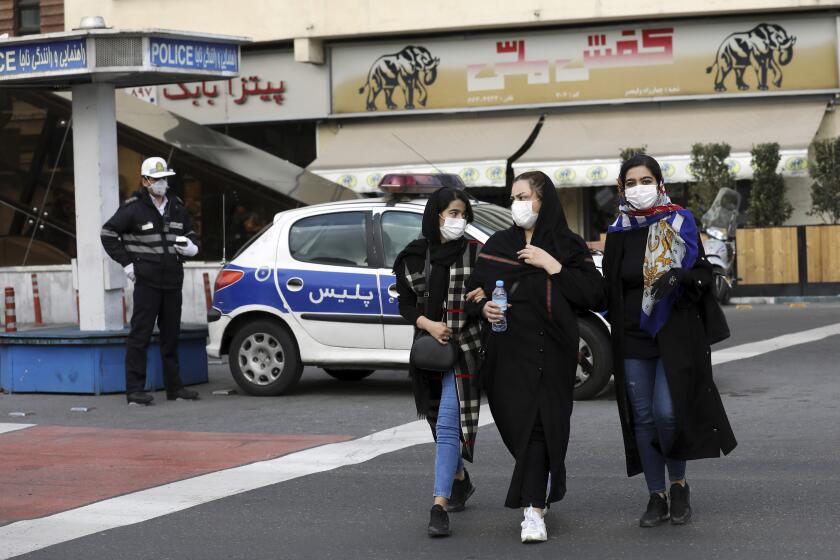In Iran’s presidential election, apathy is looking like the big winner
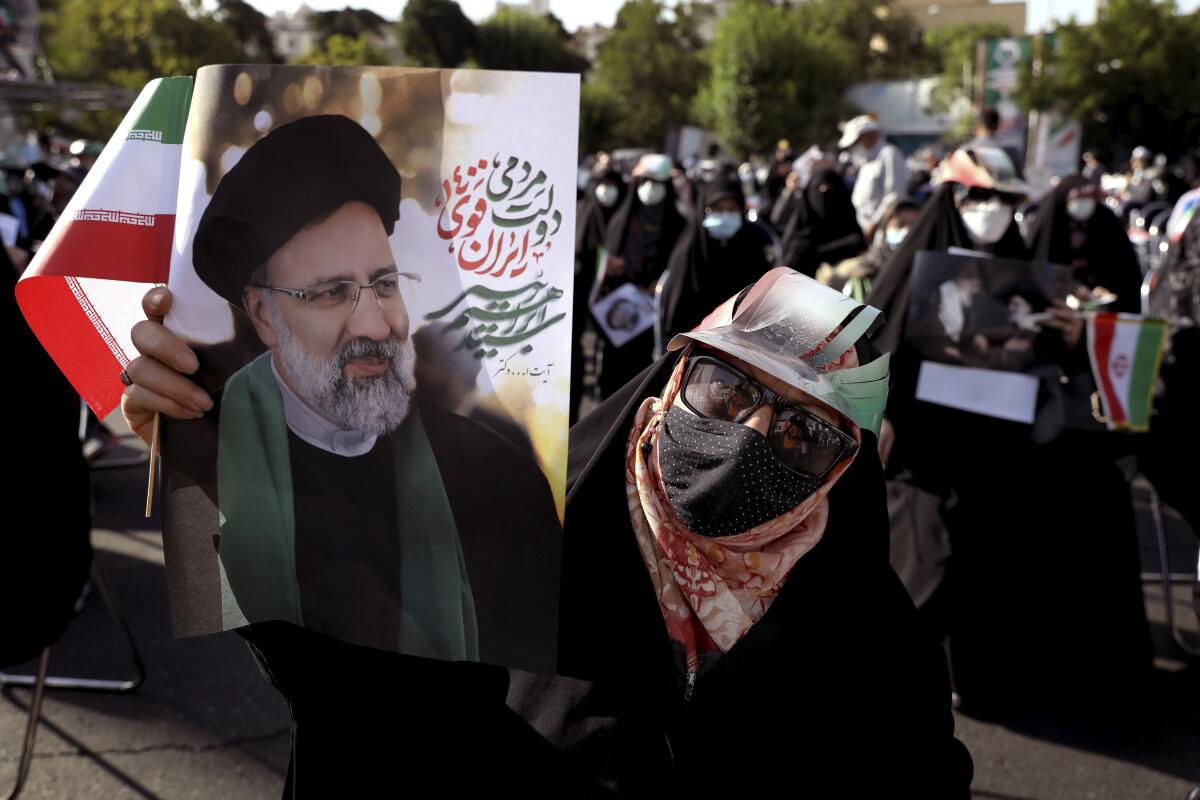
- Share via
TEHRAN — When Iranians head to the polls Friday, they’ll be participating in a presidential contest that few seem excited about.
With a field of candidates comprising mostly hard-liners — including front-runner Ebrahim Raisi, the current judiciary chief and a protege of Supreme Leader Ayatollah Ali Khamenei — one moderate and no reformists, the race has met with unprecedented levels of voter apathy, especially in larger cities such as the capital, Tehran. Even official polls suggest turnout will hover around 40% of the country’s 59.3 million eligible voters, almost half the proportion that participated in the last presidential election, in 2017.
Yet issues of major import loom over the Islamic Republic, including its tanking economy, the Middle East’s deadliest COVID-19 outbreak and Tehran’s relations with the West, particularly efforts to revive a moribund international nuclear accord with renewed U.S. participation.
Concern over widespread voter apathy prompted Khamenei to try to coax voters to the polls by declaring in a live television address Wednesday that participating in elections was “an act of virtue.”
“Those who are discouraging the people from participating in the elections are working to weaken the Islamic government in order to turn the country into a parade ground for terrorists,” he said, according to a report by the state-run Islamic Republic News Agency.
He added that “people’s presence … means that the Islamic Republic is supported by the people. The people’s support of the system must be shown to the enemy.”
Hit by pandemic exhaustion and plummeting incomes, Iran’s healthcare professionals are emigrating in big numbers when the country can least afford it.
For all presidential elections, the constitutional Guardian Council vets and approves would-be contenders. Khamenei chooses half the 12-member panel, which ensures its control by fellow hard-liners.
For Friday’s election, Iran’s 13th since the 1979 revolution, the council whittled a pool of more than 500 candidates down to seven, disqualifying any reformist or moderate politicians of note, including former parliament speaker and potential challenger to Raisi, Ali Larijani, and the vice president, Eshaq Jahangiri.
The final list had only two candidates who aren’t hard-liners: central bank governor Abdolnaser Hemmati and little-known reformist politician Mohsen Mehralizadeh. The major reformist parties refused to endorse either, in protest against the disqualification of their own top candidates.
By Wednesday, two hard-line candidates announced they were withdrawing in a bid to shore up support for Raisi, while Mehralizadeh bowed out to boost Hemmati’s prospects. Only four candidates are left in the race.
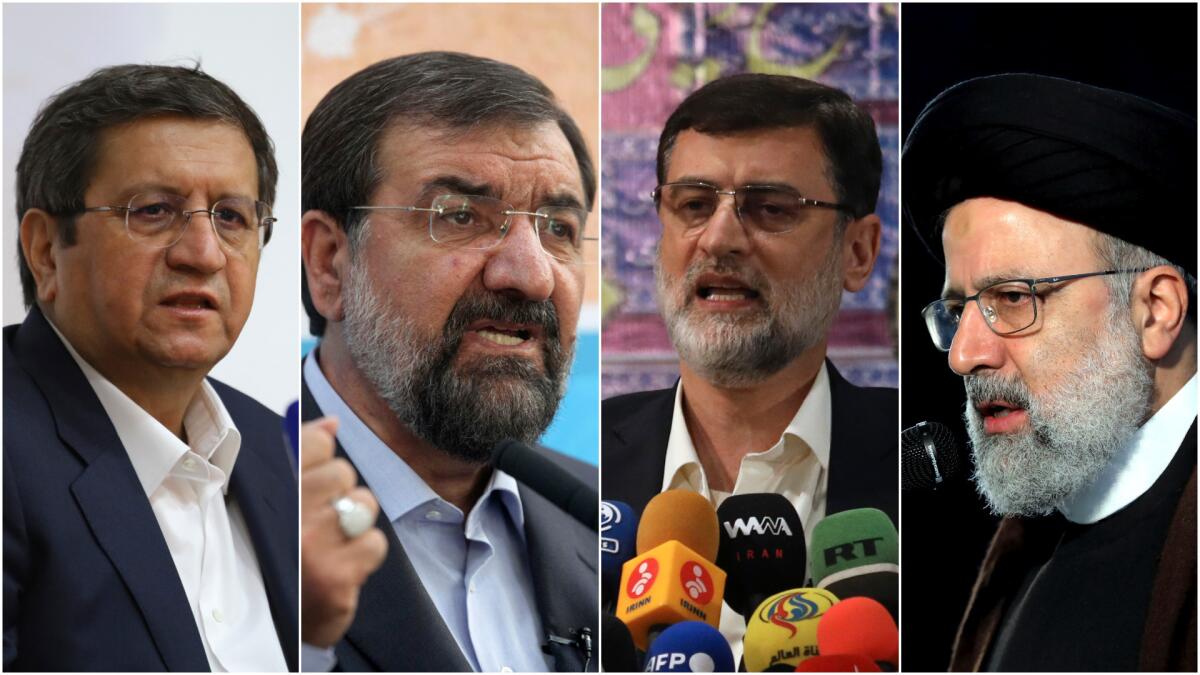
None of them appeals to Mostafa, a 40-year-old civil servant who declined to give his last name. He said he had voted in all previous elections since turning 18, but this time, in a reflection of the prevailing mood, “I’m not going to vote because I don’t find any top politician among vetted candidates.”
“None are even close to the type I like,” he added.
On Twitter, the Persian hashtag “I won’t vote” was trending.
A recording of Iran’s foreign minister offering a blunt assessment of diplomacy and the limits of the country’s power has caused a stir.
Much is at stake, though. With Khamenei 81 years old and reportedly ill, the next president is likely to oversee the selection of the ayatollah’s successor, in what is certain to be a bruising battle for a post that wields control over almost all aspects of Iran’s governance.
Of more immediate concern are the ongoing negotiations with the U.S. over a potential return to the landmark 2015 nuclear deal struck between Iran and world powers.
The agreement, which limited Tehran’s development of nuclear weapons in exchange for sanctions relief, was the centerpiece foreign policy achievement of Hassan Rouhani, the outgoing president, who scored a surprise victory over Raisi in the 2017 election largely on the strength of his more moderate platform.
President Trump pulled the U.S. out of the agreement in 2018 and shifted to a “maximum pressure” campaign, slapping far-reaching injunctions on Iran that have since devalued the local currency, the rial, to around 240,000 to the U.S. dollar, a nearly fivefold drop. It also eviscerated moderates’ economic plans, leaving the field to powerhouse companies controlled by Iran’s Revolutionary Guard and Khamenei.
News Alerts
Get breaking news, investigations, analysis and more signature journalism from the Los Angeles Times in your inbox.
You may occasionally receive promotional content from the Los Angeles Times.
Trump’s move was a boon to hard-liners, who already believed negotiations with Washington to be a fool’s errand.
President Biden has pledged to revive and rejoin the nuclear accord, known as the JCPOA. But talks are snagged over a possible expansion of the deal to cover Iran’s ballistic missile program as well as its support for Shiite armed factions across the region, including Yemen’s Houthis and Lebanon’s Hezbollah. Iran says it will not countenance any expansion of the accord before the original agreement is reinstated.
Raisi, 60, an ultraconservative judge sanctioned by the U.S. in 2019 for his involvement in Iran’s 2009 crackdown on protesters and the 1988 execution of political prisoners, including minors, has long stood against rapprochement with Washington. But he has expressed a pragmatic view of the JCPOA, describing it as a “national document” to which he would adhere.
It’s also an obvious prerequisite for a much-needed boost to Iran’s economy, which has been further sandbagged by the COVID-19 pandemic. On Thursday, the country recorded a cumulative total of more than 3 million coronavirus cases and 82,000 COVID-19 deaths.
The coronavirus outbreak has erupted into the Islamic Republic’s latest image crisis. The government’s handling of the virus’ spread is a critical test not only for its healthcare industry but also for its political legitimacy.
A poll published by state-owned English-language broadcaster Press TV showed Raisi with more than 57% of the vote, followed by conservative Mohsen Rezaei with 5.8%. Hemmati trails in third with less than 3%.
With tens of millions of voters expected to shun the polls, many expect Friday’s election to be little more than a coronation for Raisi.
Still, at a Cabinet meeting Wednesday, Rouhani exhorted people to “safeguard the republic.”
“If we have a complaint about a single institution or the administration’s measures, that is fine,” he said. “The solution, however, is not a breakup with ballot boxes.”
Special correspondent Khazani reported from Tehran and Times staff writer Bulos from Beirut.
More to Read
Sign up for Essential California
The most important California stories and recommendations in your inbox every morning.
You may occasionally receive promotional content from the Los Angeles Times.
